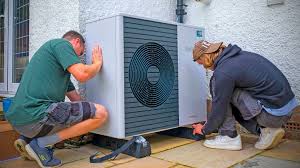
How to Maximize the Lifespan of Your Heat Pump
Heat pumps are gaining popularity as an effective alternative to conventional cooling and heating systems however their impact on the environment is an important factor to take into consideration. These devices work by transferring heat, rather than generating heat pump (tepelné čerpadlo) by combustion which could lead to significant reductions in greenhouse gas emissions as well as consumption of energy.
How Heat Pumps Work
Heat pumps operate on a simple premise: they move heat from one place to another rather than making it from scratch. In winter, they take heat from outside air, ground, or even water and bring it to the indoor environment. In the summer it reverses the process by removing heat from the indoor space and releasing it outside. This method is fundamentally different from the traditional methods that burn fossil fuels to generate heat.
Energy Efficiency
One of the biggest advantages for heat pump is its efficiency. They can supply up to three times more heating energy to a house than the electrical energy they consume. This efficiency is measured by the coefficient of performance (COP), which measures how much heat is produced in a given amount of energy consumed. A typical heat pump has a coefficient of performance (COP) of approximately 3, which means it is able to produce three times the amount of heat than the energy it consumes.
Reduction in Greenhouse Gas Emissions
Utilizing electricity instead of the fossil-fuels used in heating, heat pump can lower the emissions of greenhouse gases. The environmental impact of the heat pump is contingent on the source of the electricity used to power the heat pump. In areas where the grid is primarily powered by renewable energy sources The reduction in emissions can be substantial. However, in those areas where electricity is derived predominantly from coal or other fossil sources, these advantages are less pronounced but still present.
Environmental Considerations
While the majority of heat pump owners are environmentally sustainable, they aren’t free of environmental issues. The refrigerants used in heat pumps can be extremely greenhouse gases when they are released. Modern systems employ more environmentally benign refrigerants, but proper maintenance is essential to limit the possibility of leaks.
Furthermore, the manufacture and disposal of heat pumps also have an environmental footprint. Manufacturing requires extraction of resources and energy consumption. getting rid of them requires careful handling to prevent environmental damage.
Conclusion
Heat pumps represent a promising technique for cutting down on the use of energy and greenhouse gas emissions. Their efficiency and capacity to utilize renewable electricity make them a greener alternative to conventional heating and cooling systems. To maximize their environmental benefits it is essential to tackle issues that relate to refrigerant management as well as the overall lifecycle impact. With the advancement of technology and a shift towards more sustainable energy sources, heat pumps are likely to become an even more sustainable choice for homeowners looking to minimize their environmental impact.